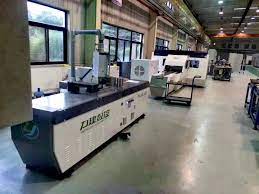In the ever-evolving busbar cutting punching and bending machine landscape of technological advancements, the role of machines has transitioned from mere tools to powerful entities shaping the very fabric of our existence. The integration of machines into various aspects of our lives has given birth to a new era marked by efficiency, innovation, and transformation. From automated factories revolutionizing production processes to sophisticated AI systems decoding intricate patterns in data, machines have proven to be invaluable partners in progress.
One of the most remarkable feats of machines lies in their ability to handle complex tasks with unparalleled precision. Manufacturing industries have embraced automation, leading to increased productivity, reduced errors, and enhanced cost-efficiency. This shift has not only elevated the quality of products but has also paved the way for human workers to focus on creativity, problem-solving, and higher-order tasks, driving a surge in innovation across sectors.
Artificial Intelligence (AI) has emerged as the crown jewel in the world of machines. AI algorithms have the capacity to analyze colossal datasets, offering insights that were once unfathomable. This capability has revolutionized fields such as healthcare, finance, and even creative arts. Machine learning algorithms have the power to predict disease outbreaks, optimize financial investments, and even compose music and art. These AI systems act as virtual assistants, amplifying human potential and driving us towards uncharted territories.
However, as machines continue to weave themselves intricately into the tapestry of our lives, ethical and societal considerations come to the forefront. Discussions about job displacement, privacy invasion, and the potential misuse of AI have sparked debates globally. Striking a balance between the capabilities of machines and the preservation of human values remains a pressing challenge.
